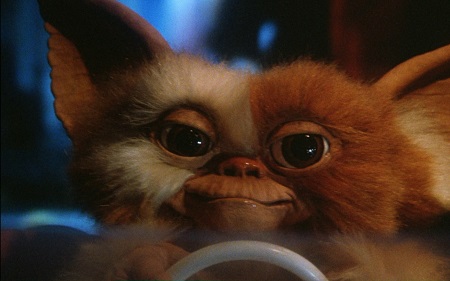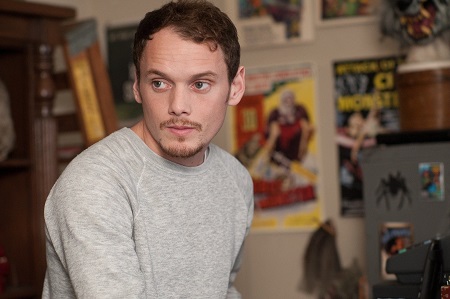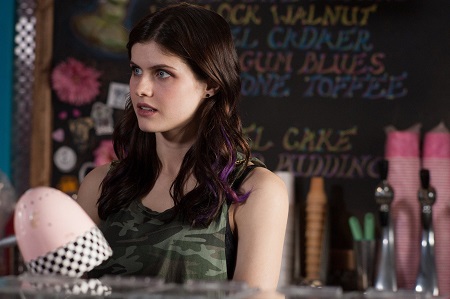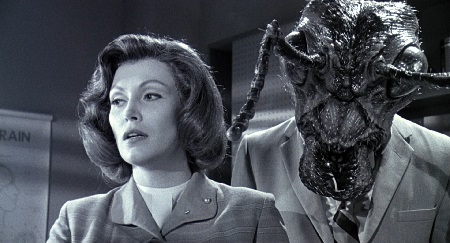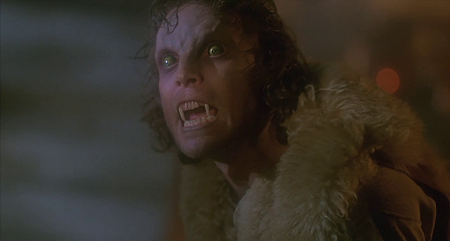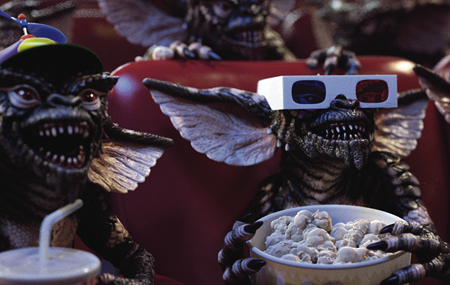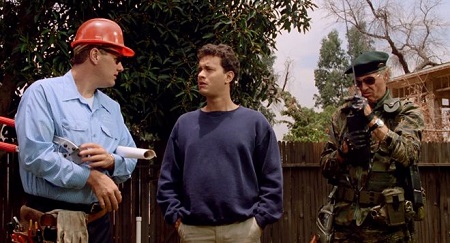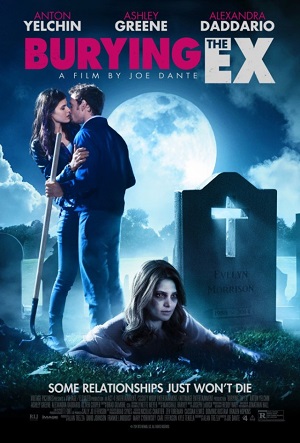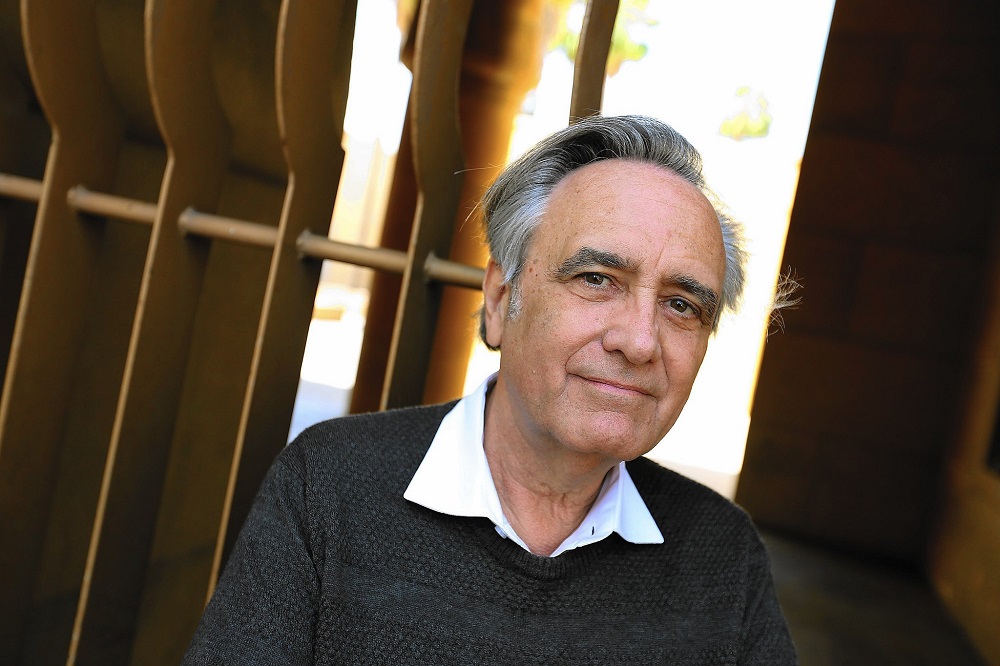
“Burying the Ex” – Interview with director Joe Dante
by Sara Michelle Fetters - July 29th, 2015 - Interviews
No Geeking Out
Chatting with Legendary Burying the Ex Director Joe Dante
There are moments in every film critic’s life when journalistic integrity, for at least a passing second, gets thrown into the wastebasket and unbridled fan-fueled enthusiasm takes over. It’s that instance when you’re either sitting in front of or chatting on the phone with someone you’ve idolized to the point of extravagance, looking at them and their overall body of work as one of the reasons you now do what it is you do. They helped you fall in love with cinema, sent you tearing off to your local video store, library or doing Netflix and various other internet searches for films and directors you otherwise might not have without their influence.
Such was the moment when I got a message confirming I’d be interviewing iconic director Joe Dante. Ostensibly our brief phone conversation was going to center on this week’s Blu-ray release of his latest comedy-horror hybrid Burying the Ex, but that didn’t mean the hope wasn’t there for a broader discussion about the filmmaker’s career. Heck, with Innerspace finally hitting Blu-ray as well, with talk of Warner Bros rebooting Gremlins and chatter that a new take on The Howling might be around the corner, there was plenty to yak about yet so little time to try and fit it all in. Needless to say, I was still more than excited to give it a go, even if the possibility of my devolving into a geeked-out unintelligible mess was a distinct possibility.
“Don’t geek out,” Dante pleasantly laughs. “Let’s just chat.”
Burying the Ex is a small, rambunctious little flick revolving around the horror-movie loving Max (Anton Yelchin). He’s starting to think things aren’t going to work out with his overly smothering girlfriend Evelyn (Ashley Greene), the beautiful, perky young woman attempting to control all aspects of his daily life. Yet he’s afraid to break up with her because he can’t bring himself to hurt her feelings even though he knows their relationship is doomed to failure, unwilling or unable to do what he probably should leaving things as-is much to his own misery.
Everything changes when a tragic accident sends Evelyn to an early grave, a distraught Max unsure if he’s more upset due to the fact he’s lost her or because now he doesn’t have to figure out a way to break things off. Just as things are getting back to normal, that he’s finally put grief aside and moved onto a new relationship with the bubbly Olivia (Alexandra Daddario), up pops Evelyn out of the grave undead and ready to continue with her boyfriend as if her death never in fact happened and chaos unavoidably ensues.
It’s a fun, fast and exceedingly funny riff on zombie movies and romantic comedies, screenwriter Alan Trezza fleshing out his award-winning short film into feature length taking things to increasingly, and winningly, surreal and silly places in the process. For the guy behind classic genre riffs like Piranha, The Howling, Gremlins and The Burbs this was an almost perfect fit, so much so getting the script into Dante’s hands was relatively straightforward.
“Alan gave it to me,” he says matter-of-factly. “I met him and I wasn’t aware that he’d made the short film a few years earlier and then subsequently expended it into a feature-length script so I didn’t know what to expect. I liked it. I liked the characters. I liked the fact that there were some really interesting women characters in it. It was really good.”
“But, we struggled along for a number of years trying to get the funding. We kept seeing other films with similar premises being made and yet ours wasn’t, which was annoying. But then around the time World War Z came out zombies were suddenly hot again and the money finally came in, the only proviso being that we could only have it if we were able to get the movie completed in a very short time frame. And so we leapt to work, cast it and then shot it in only 20 days, which is pretty crazy. It was just one of those opportunities that if you don’t strike when the iron is hot then you don’t get to make the movie at all.”
It’s not a lot of time, especially with a picture as sometimes convoluted and complex comedically and structurally as this one. Not that the veteran filmmaker was daunted by the challenge. “It’s my background,” states Dante. “Working with Roger Corman, I’m used to going fast if need be. I’m pretty used to working quickly. The movie didn’t have a ton of locations. It didn’t have a big cast. The makeup requirements were kind of challenging, and that takes time, but the rest of it could be done fairly fast as long as everyone was on their game. The cast was really into it and were fun to work with. The crew gave me their best efforts. Look, the film is what it is; I never intended it to be Lawrence of Arabia. But I think it’s an entertaining, very funny movie. That’s what matters.”
Also, much like a number of Dante’s previous features like Matinee and Gremlins 2: The New Batch, it allowed him the opportunity to riff and play around with various horror tropes and concepts in ways bordering on the bizarre while at the same tie giving him ample room to pay homage to the genre he loves “I can’t remember now if the hero, Max, was a horror fan in Alan’s first script,” says the filmmaker. “I remember he worked at a Halloween store, but I’m not sure things were quite as movie-oriented as they ended up being. That was a lot of fun to play with and add. There are some nice touches there, I think.”
As for the cast, Yelchin, Daddario and Greene are all fairly popular young stars, and it’s hard not to wonder how he was able to wrangle them into a low budget independent effort such as this, especially one with a scant 20-day shooting schedule. “I really wish I could tell you,” he chuckles. “It was like I woke up one morning, I looked out, and it was like, wow! We’ve got all these people. Guess it’s time to make the movie.”
“As it turned out, they were the exact right people for these parts. They really became them. I don’t think Ashley had been given the opportunity to do comedy and she really relished it. Alexandra, of course, she’s on her way to major stardom because she’s not only gorgeous but she’s really talented and a lot of fun to be around. And, Anton of course, is just making all of these wonderful, interesting career choices. He’s fearless. In order to satisfy himself he’ll do these pictures that don’t cost a lot of money or can pay him a lot of money but he just wants the parts, wants the challenge. Then he’ll go on and do stuff like Star Trek and that will pay for another year of working in all of these quirky, low budget productions.”
Yelchin is very good here, adding a quiet, introspective melancholy to the picture I personally found sublime. “He’s not unlike the character he is playing,” explains Dante. “He’s not a wussy pushover like Max, of course, but he is very thoughtful, very analytical, and those are facets he made sure to bring to his performance. [Anton] is really one of the brightest actors I’ve had the pleasure to work with in quite a long while.”
Then there’s Greene. In many ways she was one of the best things about The Twilight Saga, enlivening things so much with her presence sitting through those forgettable tween fantasy-romance-adventures her character was the only one I’d potentially liked to have known more about if I’d have been able to. She’s sensational, delivering a tour de force comedic performance that’s as ferocious as it is juvenile, as terrifying as it is emotionally affecting, so much so it’s hard not to wonder after the film ends how the actress isn’t a bigger star than she sadly is.
“Well, you know, when you look at the number of people in movies and television who are famous for one reason or another for a period of two or three years, if they don’t get the right parts or get the right breaks they tend to fall through the cracks,” he states with a hint of melancholy. “This doesn’t mean they’re not talented. Quite the opposite. It just means they haven’t made a lot of the right commercial choices, and Hollywood likes commercial choices, so they more often than not get left behind for the new wave of young people coming up into ascendance right behind them. It’s always been difficult to maintain a career in Hollywood and, today, with so many more venues, so many more outlets to act, that’s ironically going to become even more difficult. I really have a respect for anybody that can maintain a successful career in Hollywood for any length of time because, with the way things are now, that’s a very difficult thing to do.”
“But Ashley? Ashley is a terrific actress. She’s very, very funny here, I think, very talented. As I said, these were the exact right people for these parts. We were very lucky to get all three of them.”
Both of Dante’s most recent efforts, the unsettlingly – and entertainingly – flighty 3-D thriller The Hole and now this, didn’t get much support from their domestic distributors, getting tiny theatrical releases augmented with day-and-date availability on VOD. This would not have been the case twenty, maybe even ten years ago, a fact not lost on the director. “They would have been released by studios,” Dante says plainly, devoid of emotion. “That’s just the truth of the matter as far as that goes. But that day is over. Plain. Simple. Done. And we’re not going to be going backward.”
“Listen, I’m pretty used to people discovering my movies in other ways than theatrical exhibition. Almost all of them made their mark on home video. A picture like Innerspace, it didn’t make any money at the box office but it was one of the first VHS releases to come out in Letterbox and ended up getting passed from household to household and developed this loyal cult following.”
“I think a lot of filmmakers from the ‘80s owe their extended careers to home video. It came along and saved them. These movies used to just come along, exit theatres and go straight into the dustbin or they’d show up at 3:00 a.m. on a local UHF channel on Sunday morning. But then the video store phenomenon happened. It helped spawn filmmakers like Quentin Tarantino. It gave people the opportunity to just pick and choose whatever they wanted off of the shelves, and movies that ad no publicity or very little cache suddenly were getting this great word-of-mouth from people who were watching them on video. That’s how cult movies were born.”
Innerspace is just one of the director’s films to only over time be slowly regarded as a classic. While The Howling was a critical favorite and Gremlins was a box office smash, more often than not the director’s output didn’t meet with either the acclaim or the financial success he or the studios that funded them had initially hoped for. Years later, however, Piranha is regarded as one of the great, perceptively ingenious exploitation satires of its time. Gremlins 2: The New Batch is thought of as a richly comedic satire superior to its still popular predecessor. Same in many ways goes for the Tom Hanks starring The Burbs, while in many circles the filmmaker’s sweetly melancholic Matinee is thought of as a lost, unheralded classic worthy of rediscovery.
“That’s a generational thing,” says Dante. “I’m a firm believer in that you can’t tell the worst movie the week it is released. There’s so much else going on in the zeitgeist that colors the reception of the movie that it takes a little while for people to oftentimes get the full measure of it. A lot of movies that we now consider these great classics like The Wizard of Oz or Touch of Evil or It’s a Wonderful Life, these were all movies that either didn’t make money, had been critical reception or sometimes both. Now, of course, in hindsight, people look again at some of these pictures certain things rise to the top and a number of movies that were completely ignored during their initial release are suddenly now on the list of the best movies ever made.”
As we’re chatting I remark that the new Blu-ray release for Innerspace arrived the very day I watched Marvel’s Ant-Man, that I was struck by just how smart, how prescient, that Dennis Quaid-Martin Short science fiction comedy hybrid proved to be all these years later. It’s a superior effort, and as much as I enjoyed Ant-Man Dante’s film is an undeniably more satisfying adventure in almost every way that matters.
“I think you find that to be true more often than you think,” he muses. “It’s a measure of a pretty good movie, isn’t it? If it’s a movie that you like and you go back and watch it again sometimes you’re a little disappointed because there isn’t much more there than what there was when you saw it the first time. But, sometimes, maybe a lot of times, it surprises you, and you see things in the movie that you didn’t notice the first time, you start seeing things that no one, not even the filmmakers, could have known were going to be a part of the zeitgeist at the time, that those elements would still ring true ten or twenty years later. I’ve been lucky enough to make a lot of those pictures.”
Talking about his older films, the subject of remakes understandably arises. With the 1980s apparently under assault by Hollywood looking to make all things old new again, with talk in the air of rebooting Gremlins, with remaking The Howling, with the director’s Piranha already given a gore-filled makeover back in 2010, his thoughts on the matter seem more apropos than ever.
“Usually when they remake one of these movies, and if they’re doing it right, they’ll find some way to exploit some avenue of the movie that wasn’t done well or take it in a different direction that still stays true to the ideas of the original,” Dante explains. “Films like Warren Beatty’s Heaven Can Wait, which is a remake of Here Comes Mr. Jordan, but substitutes football for boxing and still manages to be a classic in its own right. It’s a wonderful movie.”
“There’s nothing wrong with remakes. A lot of our favorite movies are remakes. It is odd that, now at least, people only seem to want to make remakes. It’s like, let’s take something that worked before and it will somehow be worth spending all of this money on. But they make things like this Robocop remake or this Total Recall remake, you get all of these remakes that people don’t really want to see because they’re not finding a way to make them new, to make them matter. The original is just fine, thank you.”
Not that the original creators of these classics are entirely being left out of the creative discussion. Just this summer, George Miller re-emerged at the ripe young age of 70 to unleash Mad Max: Fury Road upon an unsuspecting world, the film not only one of year’s biggest surprises but also proving to be one of its absolute best motion pictures.
“That’s very true,” he agrees, “But George is a very talented filmmaker. And, let’s not forget, he wasn’t remaking his own film. He was making another one of them. He was continuing the story. It was an addendum, if you will.”
So would that mean he’d take Warner Bros’ call if they asked him to take another shot at Gremlins? “The problem with that is that I think Warner and Amblin own the project and they have their own ideas as to what they’d want to do next with it,” he says with a shrug. “Now, I’m not sure they know what those are. But, they’ve apparently been working at it. Nonstop. All the time. At least, that’s what I keep hearing. It’s a popular question in interviews, that’s for certain.”
I can’t help but admit my love for Gremlins 2 during this part of conversation. With that being the case, I ask him if the Presidential aspirations of Donald Trump might have given him any ideas of where things potentially could have gone next, wondering if it might be time for Daniel Clamp to start a Gremlins-aided campaign for the Oval Office.
“Daniel Clamp is a much nicer person,” says Dante with a hearty laugh. “He’s too good a guy to go in the same direction as Trump, no matter how much chaos he might have inadvertently caused with those Gremlins way back when. And, actually, more of Daniel Clamp was based on Ted Turner than he was anyone else. So there’s that, too.”
As for those hoping for domestic Blu-ray releases of past Dante efforts The Burbs and Matinee, there’s sadly not a lot for the director to say on the subject. “I don’t know about domestic,” he answers candidly. “I hope so, at some point, but right now I just don’t know. I do know that if you have an all-regions Blu-ray player there are a pair of excellent Blu-rays, one from France for Matinee and the other from England for The Burbs. The latter disc even includes the rough cut of the film, which I am happy people get a chance to see. But, domestic releases? Hopefully it will happen for both films. I can’t say I know when, though.”
And what’s next for Dante? What’s on the table? “Staying in the business,” chuckles the director. “I have projects I’m working on, but I hardly ever talk about them because I’m tired of talking about things that don’t for whatever reason end up panning out. But, now that I have a European passport, I’m looking to make some projects in Europe which I’m excited about. I’m excited to see some of those hopefully get off the ground.”
With time running out, I ask the filmmaker what he hopes will happen now that Burying the Ex is bowing on Blu-ray after barely getting any sort of theatrical exhibition earlier this year. His thoughts are hardly surprising. “Ten theatres is not much of a theatrical release,” Dante says good-naturedly. “But that’s the general rule nowadays. Small movies like this tend to be more about the VOD than the theatrical distribution. The deal is how to get people to pay to see the movie, whether in the theatre, VOD or via DVD or Blu-ray instead of going to a pirate site and downloading it illegally. That’s the trick.”
“But I have no idea what to expect. Like The Hole, [Burying the Ex] wasn’t supposed to be a VOD release; it was supposed to be theatrical. I have no idea how they compute the returns, how they track how many people watch it. At the end of the day I just hope they enjoy the film. It was fun to make and the three stars are terrific. It’s an entertaining picture.”
– Portions of this interview reprinted courtesy of the SGN in Seattle
